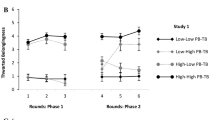Abstract
Two studies explored interpersonal factors influencing attributions of defensiveness. In Experiment 1, 22 pairs of undergraduate participants interviewed one another regarding their “worst failure.” Participants’ self- and other-attributions of defensiveness following the interview did not differ significantly, indicating the absence of a self-serving bias. In Experiment 2, 48 participants, assigned to one of three conditions, were interviewed by the experimenter about their “worst failure.” Those who received “extremely defensive” ratings from a fictitious psychologist produced significantly higher self-ratings of defensiveness (p<.0001) than did participants who simply completed self-ratings following the interview or who watched a videotape of the interview prior to completing self-ratings of their interview behavior. A new model of psychological defense is presented, which can account for these results.
Similar content being viewed by others
References
Baars, B. J. (1988).A consciousness. New York: Cambridge University Press.
Blass, T., & Kaplowitz, H. (1990). A longitudinal study of the actor-observer attributional effect.Personality and Individual Differences, 11, 259–264.
Branden, N. (1994).The six pillars of self-esteem. New York: Bantam Books.
Catalano, J. S. (1990). Successfully lying to oneself: A Sartrean perspective.Philosophy and Phenomenological Research 50, 673–694.
Ditto, P. H., & Lopez, D. F. (1992). Motivated skepticism: Use of differential decision criteria for preferred and nonpreferred conclusions.Journal of Personality and Social Psychology, 63, 568–584.
Fingarette, H. (1969).Self-deception. London: Routledge & Kegan Paul.
Ford, G. G., Bridwell, A. M., & Morgan, M. L. (1995). “Self-deception and psychological defense: A synthetic reconceptualization.” Unpublished manuscript.
Freud, S. (1957). The unconscious. In J. Strachey (Ed. and Trans.),The standard edition of the complete psychological works of Sigmund Freud (Vol. 14, pp. 161–215). London: Hogarth Press. (Original work published 1915).
Freud, S. (1961). The ego and the id. In J. Strachey (Ed. and Trans.),The standard edition of the complete psychological works of Sigmund Freud (Vol. 19, pp. 3–66). London: Hogarth Press. (Original work published 1923).
Gergen, K. J. (1990). Therapeutic professions and the diffusion of deficit.The Journal of Mind and Behavior, 11, 353–368.
Gigliotti, R. J., & Buchtel, F. S. (1990). Attributional bias and course evaluations.Journal of Educational Psychology, 82, 341–351.
Lipe, M. G. (1991). Counterfactual reasoning as a framework for attribution theories.Psychological Bulletin, 109, 456–471.
Sartre, J. P. (1956).Being and nothingness (H. E. Barnes, Trans.). New York: Philosophical Library (Original work published 1943).
Schafer, R. (1992).Retelling a life: Narration and dialogue in psychoanalysis. New York: Basic Books.
Stone, R. V. (1981). Sartre on bad faith and authenticity. In P. A. Schilpp (Ed.),The library of living philosophers: Vol. 16. The philosophy of Jean-Paul Sartre (pp. 246–256). La Salle, IL: Open Court.
Storms, M. D. (1973). Videotape and the attribution process: Reversing the perspective of actors and observers.Journal of Personality and Social Psychology, 27, 165–175.
Urban, M. S., & Witt, L. A. (1990). Self-serving bias in group member attributions of success and failure.Journal of Social Psychology, 130, 417–418.
Author information
Authors and Affiliations
Rights and permissions
About this article
Cite this article
Bridwell, A.M., Ford, G.G. Interpersonal variables affecting attributions of defensiveness. Current Psychology 15, 137–146 (1996). https://doi.org/10.1007/BF02686946
Accepted:
Issue Date:
DOI: https://doi.org/10.1007/BF02686946




